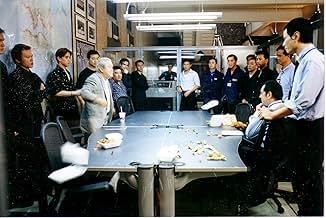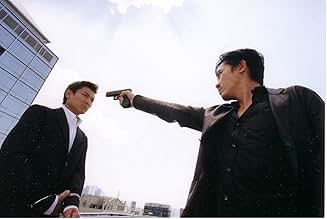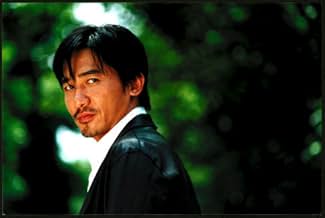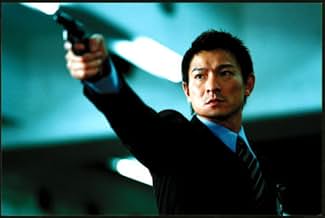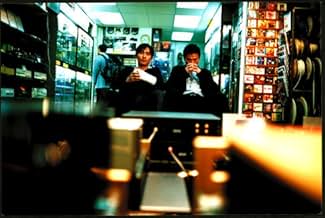Una storia tra una talpa del dipartimento di polizia e un poliziotto sotto copertura. I loro obiettivi sono gli stessi: scoprire chi è la talpa e chi è il poliziotto.Una storia tra una talpa del dipartimento di polizia e un poliziotto sotto copertura. I loro obiettivi sono gli stessi: scoprire chi è la talpa e chi è il poliziotto.Una storia tra una talpa del dipartimento di polizia e un poliziotto sotto copertura. I loro obiettivi sono gli stessi: scoprire chi è la talpa e chi è il poliziotto.
- Regia
- Sceneggiatura
- Star
- Premi
- 24 vittorie e 26 candidature totali
Tony Leung Chiu-wai
- Chen Wing Yan
- (as Tony Leung)
Anthony Chau-Sang Wong
- SP Wong Chi Shing
- (as Anthony Wong)
Ka-Tung Lam
- Inspector B
- (as Lam Ka Tung)
Ting Yip Ng
- Inspector Cheung
- (as Ng Ting Yip)
Chi-Keung Wan
- Officer Leung
- (as Wan Chi Keung)
Kam Fung Hui
- Cadet School Principal
- (as Hui Kam Fung)
Recensioni in evidenza
A deceptively simple idea lies at the heart of this complex thriller: the Hong Kong police and a triad gang both have an informer in each other's organisation: whoever's man picks the enemies' spy first wins the game for his side. Add to that the customary double-agent-doesn't-know-which-side-he-is-on-anymore subplot (doubled, of course), and you have plenty of ingredients for a plot, although it's to the movie's credit that although a little stylised, it never seems false or contrived. Fast-paced and bold, with a generous score, it never insults the viewer's intelligence either, and features just the right level of moral ambiguity. At one level, it's just another thriller, and there's little in the way of wider political or social subtext; but on the other hand, it's a textbook lesson in the art of making this sort of film.
This movie has been regarded as the cream of Hong Kong gangster and cop movie. And has won 22 awards. But we all know awards don't mean a thing sometimes. The God Father of America cinema "Martin Scorsese" himself is making a American version of the movie, titled: Departed. I'm somewhat happy to see that this movie is being recognized and acknowledged by a true master, but distraught to the possibility of disappointment.
A little history of Hong Kong film industry, being in somewhat government free state for over 100 years, Hong Kong movie industry proliferated to the state of hysteria. On one hand, everything goes as long as people get what they want for 2 hours worth. On the other hand, lack of political drama has afforded the gangster and cop drama to truly grow and mature.
Now back to the movie itself. 3 years ago, when I was still a poor student, I was loitering in the local Chinese video store as usual, looking for something exciting. The owner handed me a VHS copy of this movie, he personally recommended it and said it's new and unique. So I went home and watched it immediately. And then I said in my then dark and dingy apartment for 30 minutes, in utter silence.
There was no plot twist, and no surprise ending, no Mr. M Night's heavy handed gimmicks and Hollywood's camera tricks. But from the beginning to the end, for full 2 hours, you can cut the tension with a knife. In the end, you still don't want it to end. The story goes on in your mind, questions, bits and pieces start to put together, characters start to take shape even after the movie ended.
In my entire life, I've never seen a movie that there isn't a single excessive frame, until I saw this movie. It has forever changed my expectation on crime drama.
The story is genius and simple enough. A mole in police department working against an undercover cop in drug trafficking mafia. They don't know each other's identity, so it is like a invisible tug war between the two competing against each other's wits. I won't reveal too much of it even though like I said, there's no plot twist.
It's a fairly popular movie that has generated huge buzz when it came out, and since been talked, compared and still highly regarded as unsurpassed by countless fans worldwide. It has an all star cast in Hong Kong cinema, and of course, the screenplay, the acting, the editing, the camera work and overall directing is flawless judging by all standards.
If you are adventurous enough to try even one Hong Kong movie, try this one.
A little history of Hong Kong film industry, being in somewhat government free state for over 100 years, Hong Kong movie industry proliferated to the state of hysteria. On one hand, everything goes as long as people get what they want for 2 hours worth. On the other hand, lack of political drama has afforded the gangster and cop drama to truly grow and mature.
Now back to the movie itself. 3 years ago, when I was still a poor student, I was loitering in the local Chinese video store as usual, looking for something exciting. The owner handed me a VHS copy of this movie, he personally recommended it and said it's new and unique. So I went home and watched it immediately. And then I said in my then dark and dingy apartment for 30 minutes, in utter silence.
There was no plot twist, and no surprise ending, no Mr. M Night's heavy handed gimmicks and Hollywood's camera tricks. But from the beginning to the end, for full 2 hours, you can cut the tension with a knife. In the end, you still don't want it to end. The story goes on in your mind, questions, bits and pieces start to put together, characters start to take shape even after the movie ended.
In my entire life, I've never seen a movie that there isn't a single excessive frame, until I saw this movie. It has forever changed my expectation on crime drama.
The story is genius and simple enough. A mole in police department working against an undercover cop in drug trafficking mafia. They don't know each other's identity, so it is like a invisible tug war between the two competing against each other's wits. I won't reveal too much of it even though like I said, there's no plot twist.
It's a fairly popular movie that has generated huge buzz when it came out, and since been talked, compared and still highly regarded as unsurpassed by countless fans worldwide. It has an all star cast in Hong Kong cinema, and of course, the screenplay, the acting, the editing, the camera work and overall directing is flawless judging by all standards.
If you are adventurous enough to try even one Hong Kong movie, try this one.
After I enjoyed Martin Scorcese's "The Departed, I decided to watch the film that inspired the celebrated director to re-make it and move the action from Hong Kong to Boston, MA, USA. I must say that I liked the original movie better: 50 minutes shorter than Scorcese's magnificent remake, "Infernal Affairs" is tighter, faster, more compelling and tells the same story better. It does not have a grand acting Jack Nicholson who basically plays Daryl Van Horne with the attitude and "Infernal Affairs" characters don't talk and don't curse as much as they do in "The Departed" but the Hong Kong's movie only benefits from it. As much as I admire Leonardo DiCaprio as Bill Castigan, Tony Leung (Yan) in his role is simply unforgettable.
I looked over a squad of reviews and was sad not to see anyone writing from Hong Kong. So I am putting in my piece.
Hong Kong movies have changed a lot in the last decade and when Infernal Affairs came out it was a real change. I noted 'Golden Chicken' was mentioned earlier, and that sums up many of the lame comedies that have recently been churned out. However the comedy is a large part of Hong Kong cinema, as is the gangster genre.
Infernal Affairs breaks with the comedy, keeps the gangsters (lau being a first class clean cut one - whilst Leung acts a remarkable strained police officer) and adds clever and intelligent tension. The acting is first class, as is the mood that truly captures the zeitgeist.
This movie is about the two characters and their similarities and moral obstacles. It also has something subtle to say.
This film was huge news in Hong Kong and the mainland. It is an important Hong Kong film.
The US remake will be more clichéd than you can imagine. This film will translate, it is not that original, no. But it has substance and mood that is valuable.
See it.
Hong Kong movies have changed a lot in the last decade and when Infernal Affairs came out it was a real change. I noted 'Golden Chicken' was mentioned earlier, and that sums up many of the lame comedies that have recently been churned out. However the comedy is a large part of Hong Kong cinema, as is the gangster genre.
Infernal Affairs breaks with the comedy, keeps the gangsters (lau being a first class clean cut one - whilst Leung acts a remarkable strained police officer) and adds clever and intelligent tension. The acting is first class, as is the mood that truly captures the zeitgeist.
This movie is about the two characters and their similarities and moral obstacles. It also has something subtle to say.
This film was huge news in Hong Kong and the mainland. It is an important Hong Kong film.
The US remake will be more clichéd than you can imagine. This film will translate, it is not that original, no. But it has substance and mood that is valuable.
See it.
Beautifully shot, cleverly constructed, humorous, dramatic, and humane. I never felt bored or rushed for a moment. Expect to have to concentrate on who is who, especially at the beginning, who is or might be on to whom and how, and what they might decide to do about it. Others have said that the two leads are excellent and I'm sure they're right, but I especially appreciated Eric Tsang as Sam.
It's elegant without being heartless. I felt the main characters' longing for truth in their lives, and the various different virtues, flaws, loyalties and motivations of many others too.
I was interested to see that virtually all the violence happens off-camera. It reminded me of 'authentic' productions of Classical Greek plays. Their plots often included murders, but violence was not permitted to be shown directly. A character would describe what had happened, and then a tableau of corpses would be revealed, on a wheeled wheels if I remember correctly from one production. Almost the same device is used in this film, and it's very effective when it's done well, as here.
The friend I went with would have liked to the female characters given bigger roles. Personally (I'm a woman myself, if it makes a difference) I don't care about that. I did notice, though, the way the female characters were used as symbols to represent the good and truthful side of life. It struck me, in connection with this, that sex and violence were being treated as opposites, whereas in many US films they are treated almost as two aspects of the same thing and as depending on one another, hardly existing independently. How many plots are driven by the kidnapping or other ill-treatment of the hero's wife/girlfriend/squeeze, so that the violence against her - whether she resists it violently or not - is used to justify and supposedly motivate the whole towering nonsense by virtue of her sexual relationship with the hero? It often seems that the villian's real offence is thought to be less assault on a person, than theft of property. And I wonder if, when the US remake appears, this tedious plot device will have crept in? But I digress - it was just an idea that occurred to me on the way home, and it tells you little about "Infernal Affairs", except that it may be one reason why I found this film refreshing.
An absorbing experience, and has made me more inclined to seek out Asian films in general, as well as films by the same director.
It's elegant without being heartless. I felt the main characters' longing for truth in their lives, and the various different virtues, flaws, loyalties and motivations of many others too.
I was interested to see that virtually all the violence happens off-camera. It reminded me of 'authentic' productions of Classical Greek plays. Their plots often included murders, but violence was not permitted to be shown directly. A character would describe what had happened, and then a tableau of corpses would be revealed, on a wheeled wheels if I remember correctly from one production. Almost the same device is used in this film, and it's very effective when it's done well, as here.
The friend I went with would have liked to the female characters given bigger roles. Personally (I'm a woman myself, if it makes a difference) I don't care about that. I did notice, though, the way the female characters were used as symbols to represent the good and truthful side of life. It struck me, in connection with this, that sex and violence were being treated as opposites, whereas in many US films they are treated almost as two aspects of the same thing and as depending on one another, hardly existing independently. How many plots are driven by the kidnapping or other ill-treatment of the hero's wife/girlfriend/squeeze, so that the violence against her - whether she resists it violently or not - is used to justify and supposedly motivate the whole towering nonsense by virtue of her sexual relationship with the hero? It often seems that the villian's real offence is thought to be less assault on a person, than theft of property. And I wonder if, when the US remake appears, this tedious plot device will have crept in? But I digress - it was just an idea that occurred to me on the way home, and it tells you little about "Infernal Affairs", except that it may be one reason why I found this film refreshing.
An absorbing experience, and has made me more inclined to seek out Asian films in general, as well as films by the same director.
Lo sapevi?
- QuizWhen Yan and SP Wong are waiting at the elevator, the digital floor counter skips the 4th floor. In China and Hong Kong, the number 4 is considered bad luck because it sounds similar to the word 'death'.
- BlooperShawn Yue (Young Chen Wing Yan) is taller than Anthony Chau-Sang Wong (SP Wong Chi Shing), and there is a brief shot of them standing together. Tony Chiu-Wai Leung (Chen Wing Yan) is clearly shorter than Anthony Chau-Sang Wong, so the character has apparently shrunken.
- Citazioni
Lau Kin Ming: I have no choice before, but now I want to turn over a new leaf.
Chan Wing Yan: Good. Try telling that to the judge; see what he has to say.
Lau Kin Ming: You want me dead?
Chan Wing Yan: Sorry, I'm a cop
Lau Kin Ming: Who knows that?
- Versioni alternativeFor the Chinese version an alternate ("politically correct") ending was used. In it, Lau gets arrested when he leaves the elevator.
- ConnessioniEdited into Infernal Affairs III (2003)
- Colonne sonoreInfernal Affairs
Composed & Arranged by Ronald Ng
Performed by Andy Lau and Tony Leung Chiu-wai (as Tony Leung)
Produced by Ronald Ng and Kwok-Leung Chan
O.P. BMG Music Publishing Hong Kong, Ltd./Catchy Music Publishing, Ltd.
I più visti
Accedi per valutare e creare un elenco di titoli salvati per ottenere consigli personalizzati
- How long is Infernal Affairs?Powered by Alexa
- What is the literal translation of the title?
- What are the differences between the Original Version and the Chinese Version?
Dettagli
- Data di uscita
- Paese di origine
- Siti ufficiali
- Lingue
- Celebre anche come
- Vô Gian Đạo
- Luoghi delle riprese
- Ten Thousand Buddhas Monastery, Sha Tin, New Territories, Hong Kong, Cina(opening scene: temple)
- Aziende produttrici
- Vedi altri crediti dell’azienda su IMDbPro
Botteghino
- Budget
- 6.428.966 USD (previsto)
- Lordo Stati Uniti e Canada
- 169.659 USD
- Fine settimana di apertura Stati Uniti e Canada
- 25.680 USD
- 26 set 2004
- Lordo in tutto il mondo
- 8.836.958 USD
- Tempo di esecuzione1 ora 41 minuti
- Colore
- Mix di suoni
- Proporzioni
- 2.35 : 1
Contribuisci a questa pagina
Suggerisci una modifica o aggiungi i contenuti mancanti






